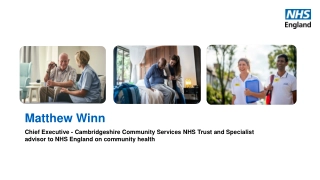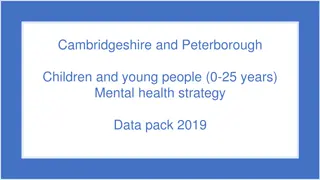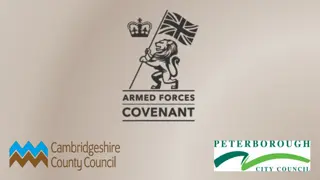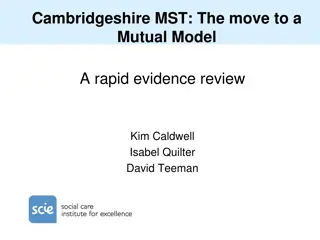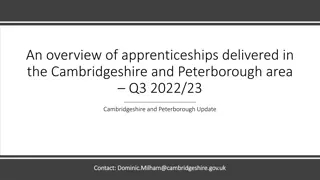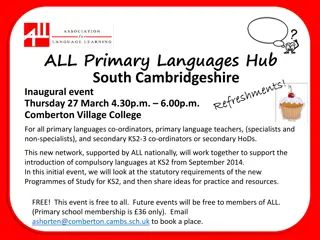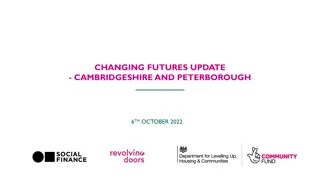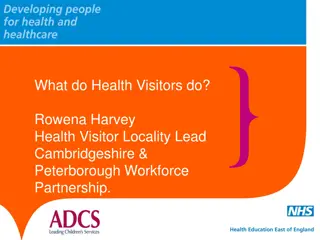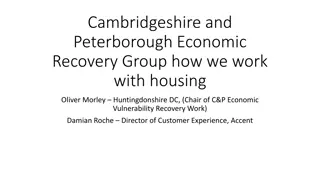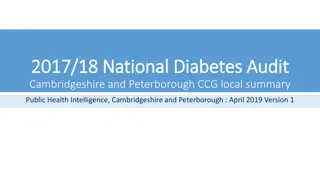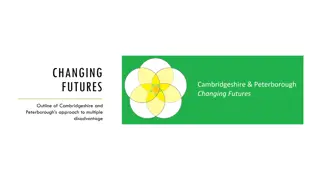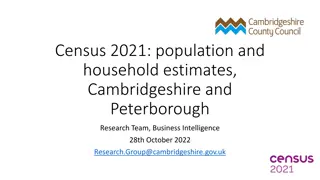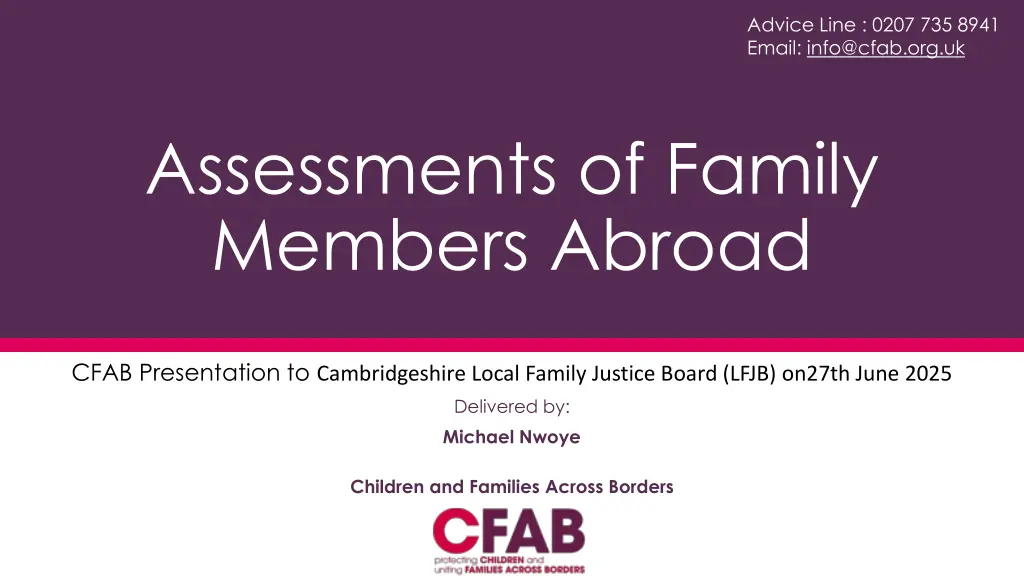
Supporting Children and Families Across Borders
Children and Families Across Borders (CFAB) has been safeguarding children and reuniting families internationally since 1955. Operating with a global network and a range of services, CFAB ensures the well-being and family life of children, irrespective of their origins. Services include assessments, case management, family reunification, and more, with a strong impact on child protection cases worldwide.
Download Presentation

Please find below an Image/Link to download the presentation.
The content on the website is provided AS IS for your information and personal use only. It may not be sold, licensed, or shared on other websites without obtaining consent from the author. If you encounter any issues during the download, it is possible that the publisher has removed the file from their server.
You are allowed to download the files provided on this website for personal or commercial use, subject to the condition that they are used lawfully. All files are the property of their respective owners.
The content on the website is provided AS IS for your information and personal use only. It may not be sold, licensed, or shared on other websites without obtaining consent from the author.
E N D
Presentation Transcript
Advice Line : 0207 735 8941 Email: info@cfab.org.uk Assessments of Family Members Abroad CFAB Presentation to Cambridgeshire Local Family Justice Board (LFJB) on27th June 2025 Delivered by: Michael Nwoye Children and Families Across Borders
Who we are Since 1955, Children and Families Across Borders (CFAB) has been protecting children and reuniting them with their families across international borders. We exist to ensure that every child in the UK has the right to care, protection and family life, no matter where they come from. We assess long-term care options for children wherever possible reuniting them with their family.
Our Global Network CFAB works with partners in over 130 countries, both as part of the International Social Service (ISS) network and through independent partnerships. We are the sole UK member of the International Social Service (ISS) a worldwide network of social workers, lawyers and other child protection professionals. The ISS is the only internationa l network focussed on inter- country social work The ISS network gives us unrivalled access to expert, on-the-ground supportto assess whether a child s return to their home country is realistic and in their best interests.
Our Impact 2024-25 174 UK LOCAL AUTHORITIES WORKED WITH CFAB 288 CROSS- BORDER CHILD PROTECTION CASES 1,742 130+ PARTNERS AROUND THE WORLD CALLS TO OUR ADVICE LINE
Casework We carry out case services in the UK and abroad referred to us by local authorities, statutory agencies, charities and individuals, as well as our partners in the International Social Service network. We offer the following services: International child protection alerts Record checks Home visits Full assessments Local assistance Pre-placement preparation sessions Post-placement support We run a free Advice Line, five days per week providing guidance and practical support on cross-border children and family cases.
Other Services 16.4 Appointments Representation of children as guardians in the courts to ensure decisions for and about children protect them, promote their welfare and are in their best interests. Life story work Direct support for children to help them process their feelings, to come to terms with their current circumstances, to make sense of their present and to develop a clear sense of identity for the future. Virtual contact supervision Multi-lingual supervision from a qualified social worker to ensure safe, positive contact of children with a non-resident family member via an online platform. Family reunification in the UK Practical and emotional support for young refugees who are reunited with family members in the UK. We also offer assessments for the family reunification process.
Training & Resources Training: International Child Protection and Kinship Care Best Interest Assessments for Unaccompanied Children Cultural Inclusive Practice Essential Skills for Social Workers International Social Work Certificate Free Lunch & Learn sessions Resources: Cultural Family Life Library Factsheets Research
A multicultural UK 35.8% of babies born in England and Wales in 2022 had at least one parent born outside the UK* In Scotland, this figure is 26%** *Office of National Statistics, Birth By parents country of birth, England and Wales: 2022 **National Records of Scotland, vital events reference table, 2022.
Enquiries & Referrals from Cambridgeshire County Council and Peterborough City Council in 24/25 Cambridgeshire County Council Peterborough City Council USA Pakistan USA Czech Republic Italy Portugal Bangladesh Romania Nigeria Lithuania Bulgaria Zimbabwe Germany Pakistan Spain Mauritius China Guinea Bissau Lithuania
Guidance on Care Proceedings with an Guidance on Care Proceedings with an International Element International Element Early consideration of jurisdictional issues (Re E (2014); PLO 2014)/ 1996 Hague Convention Co-operate through Central Authorities especially in the context of assessment (Munby P Guidance on ICACU (2014)). Discourage UK social workers travelling overseas to conduct assessments (Leicester City Council v S (2014) Notify Embassy if care proceedings issued concerning foreign nationals (Merton LBC v B (2014) but see Family Courts Informing Consular Authorities of Proceedings (18 April 2019) International Family Justice Office) DfE Guidance 1996 Hague Convention (2012) DfE Guidance Working with Foreign Authorities (2014) Then Brexit .
Obtaining Overseas assessments: Who does what? Central Authority Embassies/ High Commissions CFAB UK Member of International Social Service (ISS) Designated by Hague 1996 Convention* A country's diplomatic mission in a foreign country Representing and supporting their nationals in another country Cooperation through Central Authority in each state Cooperation through ISS partners and locally based ISWs worldwide Information and Cooperation, assessment and other services depend on the country Generic information about laws, service, support and procedures in other country Assessments, record checks, welfare visits, post placement support...etc * The Convention of 19 October 1996 on Jurisdiction, Applicable Law, Recognition, Enforcement and Co-operation in respect of Parental Responsibility and Measures for the Protection of Children
Assessments via CFAB Transparency around content ISS Network partners ISWs
Obtaining overseas assessments Direct Liaison UK Social Worker travelling overseas/ Joint Assessment Split Assessment Remote assessments/ Complementary Assessment Prospective carer(s) travelling to UK
UK Social Workers Travelling Overseas to Assess UK Social Workers Travelling Overseas to Assess Is it legal? Are the right notifications and processes being followed for the assessment and placement? What are the risks? Is it ethical? Is it culturally-informed
Overseas Assessments Overseas Assessments - - Nationality Nationality Before you start 1. What is the child s nationality? What is the prospective carer s nationality? 2. Will the child be able to lawfully reside in the country in question? May determine the type of assessment required (kinship / intercountry adoption) What will happen if overseas placement breaks down?
Immigration - USA Is Child a US citizen? Is Prospective Carer a birth parent? No Yes Kinship/ Parenting Yes No Is the birth parent a US citizen? Is prospective carer a US citizen? Yes Yes No No Parenting Seek legal advice: is birth parent allowed to sponsor the child to come to the USA? Inter-country Adoption
Guidance on Overseas Assessment Special guardianship assessments? Consideration must be given to how assessments are carried out in a legally compliant and culturally relevant manner(PLWG Special Guardianship Best Practice Guidance: SGOs March 2021) Social workers should consider working with colleagues abroad when assessing a family with links abroad, unless doing so is likely to place the child or family in danger. This may provide a more holistic picture, and help the social worker understand the unique characteristics of a child within their family, cultural, religious, ethnic and community context (DfE 2014)
Guidance on Overseas Assessment Re K, T and U [2019] EWFC 59 Whatever route is chosen there may, therefore, be gaps in the assessment and planning process. Those gaps can only be filled by active communication and whoever is charged with completing the assessment and relevant plans obtaining the missing information from other professionals. It may just not be practicable for a single professional to undertake all the work that is necessary.
Consent to Place When considering placing a child in a 1996 Hague Convention Contracting State, it may be necessary to first obtain consent from the overseas competent authority (LA equivalent) before placing (Article 33 1996 HC). Consent is required for foster family, kafala, institutional care or analogous institution some contracting state consider kinship care to fall within the scope necessary seeking advice early. Consider involvement/consent of competent authority abroad for assessment to ensure it is accepted and recognised President of the Family Division - Guidance on the Use of ICACU (2014) DfE Guidance on the 1996 Hague Convention CFAB Factsheet Article 33 1996 Hague Convention
Consent to Place Contact the Central Authority (ICACU) to find out if consent is required for the type of placement in question If consent is required transmit a report with reasons for the placement and seek consent (Article 33) Think about what post placement support you might need from that authority Failure to obtain consent could lead to non-recognition of order (1996 Hague Convention Article 23 (f)).
Recognition of Orders Court Orders in Hague 1996 Contracting States Court orders made in the UK for placement in a country that is a Contracting State to the 1996 Hague Convention should be recognised by the other country, but additional steps can be made to make sure this recognition is certain. Mirror Orders An order can be made in the country where the child is placed to mirror the order made in the UK. This is usually an option for countries not covered by Hague 1996 (but can occur in Contracting States too). Legal advice will be required from the country in question to determine the procedure and costs.
Considerations when working with overseas authorities and professionals
Difference in Policy and Practice around the world Disaster relief/ Disaster relief/ Humanitarian aid Humanitarian aid Informal Informal Social Work Social Work Community Community development development Resource provision Resource provision No foster No foster care system care system Individual vs. Communal Individual vs. Communal
Indigenous concepts Elder s wisdom Elder s wisdom Ubuntu Ubuntu Whanaungatanga Whanaungatanga Ikibiri Ikibiri Spirituality Spirituality
Timeframes Religious holidays Religious holidays Conflict Conflict Travel Travel distances distances Natural Natural disasters disasters Working Working patterns patterns Bureaucracy Bureaucracy
Communication Language Language Unfamiliar social Unfamiliar social work concepts work concepts Time difference Time difference Acronyms Acronyms
Acronyms SEND SEND GP GP MMR MMR booster booster PLO PLO CIN CIN MARAC MARAC SGO SGO Police Police MERLIN MERLIN MHA MHA CAMHS CAMHS CP CP DA DA ICO ICO EHCP EHCP NFA NFA SWET SWET IRH IRH C2 C2 application application
Cultural / legal differences Cultural Cultural practices practices Social work Social work systems systems Laws Laws Role of the community Role of the community Accepted parenting Accepted parenting approaches approaches
Pros and Cons of Local Assessments Pros Understanding of local context culture, services, environment, safety/security and law Assessor s ability to access records and verify information Assessor may have local language skills May be able to quickly build a rapport with prospective carer No legal issues regarding right to work in-country Cons Quality can vary Assessor will not have an in-depth understanding of the child and case circumstances Assessor does not have an in-depth understanding of UK procedures, laws and regulations Timescales assessments are prone to delay
Our top tips and take-aways 1. Establish child s overseas family connections 7. Consider initial screening assessments 2. Understand Nationality & Immigration (carer & child) 8. Translate key documents 9. Minimise / Explain acronyms & social work terms or processes 3. Seek legal advice (mirror/enforcing orders) 4. Identify process for overseas assessment (CFAB, Central Authority/direct contact) 10.Consider extending timeframes. 5. Explore type of assessment required (e.g. full/dual/split) 11.Give comprehensive information about child s needs & proposed support 6. Consider requirement for consent to place (Art 33, Hague 1996) 12.Specify key issues to be addressed in assessment (list of questions, no templates)
CONTACT US: Free Advice line: 020 7735 8941 Monday Friday 10am - 3.30pm Enquiries: info@cfab.org.uk Web: www.cfab.org.uk Please sign up to our newsletter




